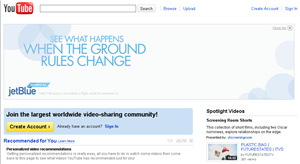Google sheds one-trick search pony rap

Google's strong third quarter report and ensuing conference call went a long way toward portraying the company as a three-headed growth monster.
The overarching theme: Google is more than paid search. It's a large display ad player and a force on the mobile front. Google's quarter topped estimates on both the top and bottom lines, but the real enthusiasm this morning revolves around display and mobile (Techmeme, statement, ZDNet coverage).

And then came the pitches. Among them:
- Display and mobile ads now account for 6 percent of net revenue.
- Display ad annual revenue run rate is $2.5 billion.
- YouTube is monetizing 2 billion page views a week, up 50 percent from a year ago. Executives were coy about YouTube profits, but the unit is clearly closer to where it needs to be.
- Mobile is clocking an annual revenue run rate of $1 billion a year.
 Jefferies analyst Youssef Squali said the additional disclosure is "no longer a one-trick pony."
Jefferies analyst Youssef Squali said the additional disclosure is "no longer a one-trick pony."
Android stole the conference call show. Google CEO Eric Schmidt was asked a lot about Android. Schmidt said:
One way to think about Android is that it's probably the largest single platform play available in the market today. Because it's a platform for computation, for location, for everything that you can do with the new and most popular set of computing devices that are emerging. That market is larger than the PC market. The tablet market is a small component of it, but an important part of it. So if you think of mobile as platform -- as phone plus tablet plus all the other things, we hope to become the leading platform in that space.
Schmidt then went into the cycle of open source, Android usage, mobile search and additional revenue. Schmidt was previously quoted as saying that Google could make $10 from each Android phone.
On that basis alone, Android is hugely profitable. And we maintain the anti-fragmentation and other things by a series of contracts around the store and so forth and so on. So, Android is likely to be financially successful to Google without even any of the applications that are possible.
So (CFO Patrick Pichette) calls up and says, okay, what else can you do for us? And the answer, of course, is that we can layer on value-added services, which is how you get to the $10 (per device). And the value-added services could be of any kind.
Add it up and Google gave folks something other than paid search to talk about. Deutsche Bank analyst Jeetil Patel sums up what has changed:
There has been an overhang on the Google story for continually investing in product development and focusing largely on paid search as a business model. The criticism and concern has been loud and clear from the markets surrounding paid search as the sole business model. However, for the first time ever, the company addressed investor concerns with a rough sketch of the non paid search business lines. While we knew there was tremendous momentum in the world of mobile (more specifically the Android O/S) and display advertising (DoubleClick Exchange and YouTube/video), it now appears Google has clearly become a three-headed monster (given the commentary last night), in terms of paid search via desktop Internet, display advertising as well as advertising in the rapidly-growing smartphone world.
Speaking of smartphones, CEO Eric Schmidt noted that Android is profitable without apps. If Google can turn on the app ad revenue stream, there's real mojo there.
However, there is still work to do. Analysts would like to see even more diversification from Google. Piper Jaffray Gene Munster said in a research note:
We believe longer term pressure is mounting for Google to introduce new, meaningful product to provide a sustainable ~15-20% growth rate beyond 2011.
But Google is off to a good start shedding that one-trick pony rap.